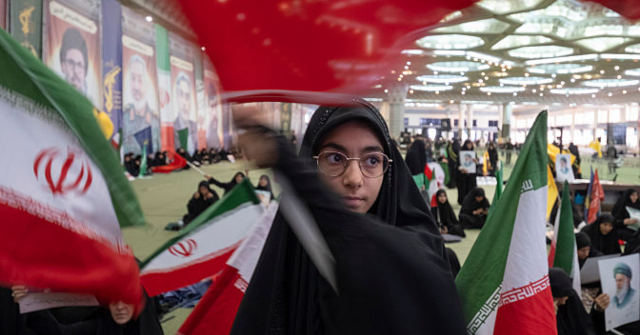Iranian state media confirmed the execution on Wednesday of Rouzbeh Vadi, identified as one of the nation’s top nuclear scientists, on charges of alleged espionage and cooperation with Israel’s Mossad intelligence agency.
Iranian news outlets announced his killing alongside the execution of Mehdi Asgharzadeh, identified as a supporter of the Islamic State jihadist terror organization. Vadi is the seventh known Iranian nuclear scientist to be killed the summer; six others were confirmed dead after the Israeli government launched “Operation Rising Lion” in June, a military engagement intended to eliminate Iran’s ability to generate fuel for a nuclear weapon.
According to a translation of broadcasts on Islamic Republic of Iran Broadcasting (IRIB), the Islamic regime published videos of Vadi confessing that he sent the Israeli government critical information on two of Iran’s most important nuclear enrichment facilities, the sites at Fordow and Natanz. Those two, alongside the facility at Isfahan, were the targets of a series of airstrikes by the United States shortly after the beginning of “Operation Rising Lion” in June. President Donald Trump announced following the strikes that the U.S. military had “completely and totally obliterated” the sites.
“Key facilities were Fordow and Natanz (uranium enrichment plants), for which I sent information. I told them I knew this and that about Fordow, they (Mossad agent) told me to send everything,” Reuters translated Vadi’s statements as saying. “The entry and exit of nuclear material into the Uranium Conversion Facility (UCF) and Fuel Manufacturing Plant (FMP) were very important to them.”
The organization Iran Human Rights noted that Vadi had been arrested 18 months ago on suspicion of aiding Israeli espionage, long before “Operation Rising Lion” and the failure of talks between Washington and Tehran that preceded Israeli action. It also listed Vadi alongside another 66 “death row protesters, prisoners of conscience, espionage and blasphemy defendants” whose lives were in danger under the repressive regime.
Iran Human Rights official Mahmood Amiry-Moghaddam warned that, in addition to concerns about espionage, the Iranian Islamist regime was attempting “to carry out the execution of political prisoners at a lower political cost,” taking advantage of the conflict with Israel.
“These sentences have been issued without fair trials and based on confessions obtained under torture, and in addition to violating international laws, they also violate even the laws of the Islamic Republic itself,” he added.
The English-language Iranian outlet Tasnim confirmed the execution on Wednesday, but did not identify Vadi as a nuclear scientist.
“The Mossad spy, Ruzbeh Vadi, was hanged on Wednesday morning after being convicted of connection with the Zionist regime’s espionage agency,” Tasnim relayed. “He had been working in one of Iran’s important and sensitive organizations. Vadi had joined Mossad through the virtual space.”
Iran International, an independent outlet, relayed that multiple Iranian regime news outlets described Vadi as being “recruited online” by Mossad agents and ultimately met with Mossad agents in person in Vienna, Austria. He was accused of this cooperation while serving in the Nuclear Science and Technology Research Institute under the Atomic Energy Organization of Iran (AEOI), the agency in charge of the Iranian regime’s illicit uranium enrichment and nuclear research. The outlet added that Iranian officials accused Vadi of sharing information on another nuclear scientist who was among those killed in Operation Rising Lion.
The opening salvo of Operation Rising Lion on June 12 devastated Iran’s military and nuclear leadership. Israeli airstrikes killed at least six prominent nuclear scientists, including top scientists Fereydoun Abbasi-Davani of the Islamic Revolutionary Guard Corps (IRGC), a U.S.-designated terrorist organization, and Mohamed Mehdi Tehranchi, the president of Islamic Azad University. The strikes also eliminated the bellicose commander of the IRGC, Maj. Gen. Hossein Salami, who regularly threatened genocide against the Israeli people.
Israel launched its military operation shortly after the International Atomic Energy Agency (IAEA), a U.N. body, passed a resolution condemning Iran for its illicit development of nuclear technology with no apparent civilian purpose. IAEA Director-General Rafael Grossi accused Iran of refusing to allow inspectors to ensure the legality of its research sites and attempting to “sanitize” areas apparently used for illicit development.
Prior to the IAEA condemnation, the administration of President Donald Trump had reopened talks with the Iranian regime intended to come to an agreement to stop its extensive uranium enrichment. Iran agreed to negotiations on the grounds that it was seeking relief from onerous American sanctions on its oil industry. Special Envoy for the Middle East Steve Witkoff, who led the talks, told Breitbart News in May that ending all uranium enrichment was a “red line” for the White House.
“An enrichment program can never exist in the state of Iran ever again. That’s our red line. No enrichment,” he explained. “That means dismantlement, it means no weaponization, and it means that Natanz, Fordow, and Isfahan — those are their three enrichment facilities — have to be dismantled.”
Iranian officials insisted they would never stop their enrichment programs. On July 21, Trump announced that he had approved the bombing of Iran’s top enrichment facilities.
“Tonight, I can report to the world that the strikes were a spectacular military success,” the president said in a national address. “Iran’s key nuclear enrichment facilities have been completely and totally obliterated.”
Follow Frances Martel on Facebook and Twitter.
Read the full article here


